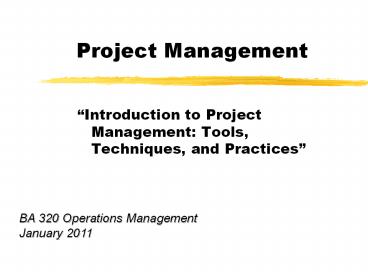Project Management - PowerPoint PPT Presentation
1 / 24
Title:
Project Management
Description:
First night introduction to PM ... Introduction to Project Management: Tools, Techniques, and Practices BA 320 Operations Management – PowerPoint PPT presentation
Number of Views:110
Avg rating:3.0/5.0
Title: Project Management
1
Project Management
- Introduction to Project Management Tools,
Techniques, and Practices
BA 320 Operations ManagementJanuary 2011
2
Projects versus Operations
- Organizations perform work - either
- Operations, or
- Projects
- Shared characteristics of projects and operations
- Performed by people
- Constrained by limited resources
- Planned, executed and controlled
3
(No Transcript)
4
Operations and projects differ
- Operations are ongoing and repetitive
- Projects are temporary and unique
- A project is a temporary endeavor undertaken to
create a unique product or service. - temporary - definite beginning and end
- unique - different in some distinguishing
characteristic
5
Examples of projects
- Developing a new product or service
- Effecting a change in structure, staffing, or
style of an organization - Designing a new transportation vehicle
- Constructing a building or facility
- Running a campaign for political office
- Implementing a new business procedure or process
6
What is Project Management?
- Project management is the application of
knowledge, skills, tools, and techniques to
project activities in order to meet or exceed
stakeholder needs and expectations from a project.
7
The project management challenge
- Meeting or exceeding stakeholder needs and
expectations invariably involves balancing
competing demands among - Scope, time, cost, and quality
- Stakeholders with differing needs and
expectations - Identified needs and unidentified expectations -
client relations challenge
8
The core of project management
published by PMI in 1987
9
Where most projects fail
10
Project Management Knowledge Areas (PMBOK)
- Scope Management
- Cost Management
- Communications Management
- Human Resources Management
- Time Management
- Quality Management
- Risk Management
- Procurement Management
11
(No Transcript)
12
(No Transcript)
13
Relationship to other disciplines - similarities
- General management encompasses
- Planning
- Organizing
- Leading
- Controlling
- PM management functions overlap
14
Function overlap
- Planning the work, schedule and budget
- Organizing and staffing a team to implement the
work - Controlling the project through tracking and
monitoring progress against the plan - Leading people and resources so the plan is
implemented and adjusted as smoothly as possible
15
Relationship to other disciplines - differences
- Much of the knowledge needed to manage projects
is unique or nearly unique to project management,
e.g. - Critical path analysis, and
- Work breakdown structures
- Primary differences between general management
and PM found in the use of specialized tools and
techniques.
16
(No Transcript)
17
Relationship to other disciplines
18
Why do you need project management techniques?
- The reason for organizing an assignment as a
project is to FOCUS the responsibility,
authority, and scheduling of the project in order
to meet defined goals. - schedule
- cost
- performance (quality)
19
Other major reasons to use PM techniques
- Clear work descriptions minimize surprises and
conflicts - Responsibilities and assignments for specific
tasks are easily identified - Reduces need for continuous reporting
- Progress can be measured against a plan
- Time limits for task completion are more easily
specified
20
The two types of project management activities
- Project planning and definition activities
- Project implementation and control activities
- More simply
- Deciding, and
- Doing
21
Planning and definition activities
- Definition of project goals and objectives
- Definition of work requirements
- Definition of quantity of work
- Definition of quality of work
- Definition of required resources
- Definition of organization structure
- Planning of task sequencing and schedule
- Planning of the budget
22
Implementation and control activities
- Initiating work
- Monitoring and tracking progress
- Comparing schedules and budgets to plans
- Analyzing impact of changes and progress
- Coordinating activities and people
- Making adjustments to the plan as required
- Completing the project
- Assessing project results
23
Success factors in project management
- Appropriately skilled project manager
- Clear authority for the PM to act
- Commitment to the PM methodology
- A skilled PM team agreed to the project goals
- A complete project plan that is understood by all
participants - Objectives that contribute to the larger goals of
the organization - Workable tracking and monitoring methods
24
Bottom line
- What project management will do is provide a
system for planning, documenting, organizing, and
communicating. - It provides a basis for better decisions
- Ultimately, it is the people who will make things
happen and make things work, not the methodology!































